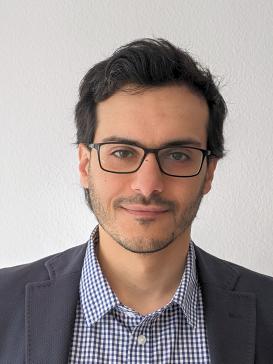Hassan El-Hajj worked as a data scientist and research IT scholar at the Institute. He received an MA in Archaeology from the American University of Beirut as well as an MSc in Geoinformation Sciences, focusing on Computer Vision and Remote Sensing research from the Technische Universität Berlin. In his thesis, he worked on Artificial Intelligence applications within advanced driver-assistance services (ADAS). He finished his PhD in Classical Archaeology at the Philipps-Universität Marburg, focusing on the geospatial analysis and reconstruction of Roman Berytus. He worked as a geospatial consultant and data scientist for numerous archaeological projects before joining the Berlin Institute for the Foundation of Learning and Data (BIFOLD) as a data scientist within the Sphaera Project of Department I between 2021 and 2022.
Hassan’s research interests center on the use of Machine Learning within the humanities and cultural domains, where he aims to bridge the gap between computer science and the humanities. His work at the MPIWG focused on historical document analysis using Machine Learning methods, as well as knowledge generation, discovery, and recommendation in Knowledge Graphs.
Selected Publications
Al Kassem, Amal, Kristen Hopper, Ismael M. Ibraheem, Hassan El-Hajj, Andreas Maier, Aamer Al Ali, and Jürgen Richter (2024). “Assessment of the Impact of the Syrian Conflict on Archaeological Sites in the Daraa Region.” Levant 56 (3): 425–446…
Read More
Valleriani, Matteo, Maryam Zamani, and Hassan El-Hajj (2024). “La dinamica di diffusione del sapere astronomico e l’agenda di ricerca come contesto della pubblicazione del De revolutionibus di Copernico (1543).” In Atti del XLIII Convegno annuale:…
Read More
Hennicke, Steffen, Pascal Belouin, Hassan El-Hajj, Matthew Fielding, Robert Casties, and Kim Pham (2024). “Sustainable Semantics for Sustainable Research Data.” In Semantic Digital Humanities 2024. CEUR Workshop Proceedings. https://ceur-ws.org/Vol…
Read More
El-Hajj, Hassan, Oliver Eberle, Anika Merklein, Anna Irene Siebold, Noga Shlomi, Jochen Büttner, Julius Martinetz, Klaus-Robert Müller, Grégoire Montavon, and Matteo Valleriani (2023). “Explainability and Transparency in the Realm of Digital…
Read More
Past Events
Symposium
Digital Humanities Developments in Taiwan and at the MPIWG
MOREDigital Humanities Brown Bag Lunch
Fantastic Creatures and Plants: Ottoman Nature in Travelogues and their Computational Explorations
MOREDigital Humanities Brown Bag Lunch
Contesting, Remaking, and Reimagining Absence among and with Digital Methods: A 3-Project Based Examination
MOREDigital Humanities Brown Bag Lunch
Exploring Images of Climate Change with Digital Methods
MOREDigital Humanities Brown Bag Lunch
Medieval Coats of Arms in the Focus of AI
MOREDigital Humanities Brown Bag Lunch
Explainable AI in the Digital Humanities
MOREPresentations, Talks, & Teaching Activities
Technische Universität Berlin
BIFOLD Opening Ceremony Symposium
Berlin-Brandenburgische Akademie der Wissenschaften (BBAW)
6th Graphs and Networks in the Humanities Conference
6th Graphs and Networks in the Humanities Conference
All-Hands-Meeting der KI-Kompetenzentren – Poster
Digital Humanities and Artificial Intelligence (DHAI) Seminar
International Workshop on Machine Learning and Digital Humanities
Technische Universität Berlin
Case of the Near East
12th International Congress on the Archaeology of the Ancient Near East (ICAANE), University of Bologna
Conference on Cultural Heritage and New Technologies, Vienna
Artificial Intelligence, Machine Learning and Deep Learning in Archaeology, British School of Rome (BSR) and the European Space Agency Center for Earth Observation (ESA-ESRIN)
British School of Rome and the European Space Agency Earth Observation Center (ESA-ESRIN)
Broadening Horizons Conference 6, Freie Universität Berlin
Freie Universität Berlin
Freie Universität Berlin
British Association of Near Eastern Archaeologists (BANEA), University of Wales Trinity Saint David – Lampeter

